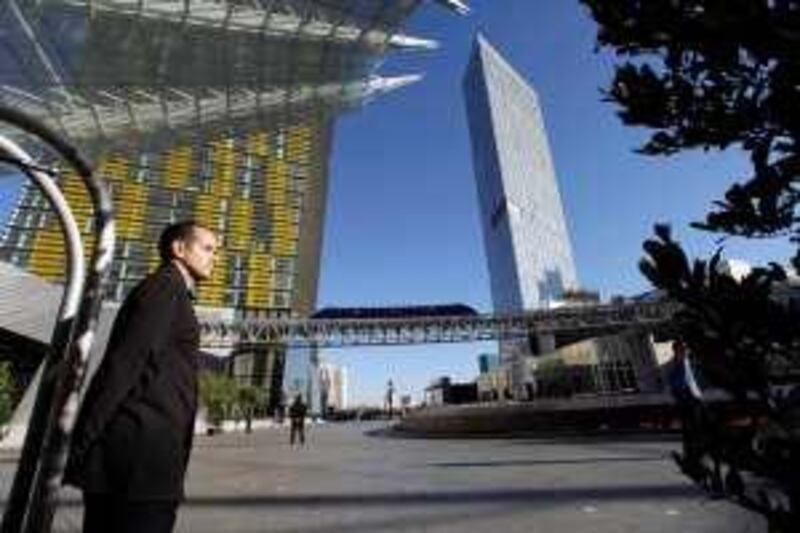LAS VEGAS // The Aria Casino and Resort, part of MGM Mirage and Dubai World's US$8.5 billion (Dh31.22bn) CityCenter complex, has been checking all systems as part of the countdown to its grand opening tonight. Under regulations governed by the Nevada Gaming Control Board, all new casinos must undergo a full 24-hour test of their accounting cycles. MGM gave fake money and hospitality coupons to several hundred of its 50,000-strong workforce in Las Vegas to enjoy themselves as well as fill in report cards, said Alan Feldman, MGM's senior vice-president for public affairs.
The test run was set to finish in the early hours of yesterday morning before cleaners and caterers moved in to prepare Aria's gleaming wood and glass interiors for the opening party and fireworks display. No big movie stars or celebrities were scheduled to attend the party. "We don't feel the need for celebrities," said Mr Feldman. "In and of itself, CityCenter is a big draw but I've no doubt celebrities will come."
MGM Mirage and Dubai World are banking on drawing in celebrities and many more ordinary people if they are to reap dividends on their investment. CityCenter's six towers sprawl over 27 hectares and contain hotels, a casino, a shopping centre, a theatre and restaurants designed by world-class "starchitects". Conceived during the heady days of the mid-2000s when credit and revenues flowed in a seemingly unstoppable stream, CityCenter is opening during a deep recession which has left Nevada one of the most directly affected regions in the US in terms of lost jobs and foreclosed homes.
But Mr Feldman said he had observed "subtle upticks" in key indicators such as hotel rates and occupancy that pointed at least to stabilisation in the overall economic picture. "It will take the first quarter of next year to get our feet beneath us [at CityCenter] and by the end of the second quarter we should hopefully see some recovery," he said. "It won't be like '09 when we were caught up in the teeth of the greatest recession in US history, a global recession at that."
Some 35 million visitors were expected to have come to Las Vegas by the end of this year compared with a record 39.2 million in 2007. Mr Feldman was hoping for at least 38 million next year. "If we can do that because CityCenter is intriguing enough to stimulate people to come, it gives everyone in this market a chance to succeed," he said. CityCenter's marketing budget is $30 million and its advertisements would resemble those for "fashion, fragrance and high-end companies, because it is all about experience, pleasure and indulgence", said Mr Feldman.
CityCenter is supposed to mark the evolution of Las Vegas into a sophisticated, multidimensional city. "We view ourselves as patrons, like the Medicis," said Jim Murren, the chief executive of MGM Mirage, referring to the 14th-century Italian political dynasty. MGM Mirage was confident CityCenter would be able to raise 80 per cent of its revenues from its non-gaming sources, including hotels, restaurants and retail. Overall, the company, which already owns a string of casinos along The Strip, raises up to 64 per cent of its revenues from non-gaming sources.
CityCenter will need to attract a considerable number of what Mr Feldman called "rejectors", people who frequent trendy resorts such as New York's Hamptons but dislike what they perceive to be Las Vegas's tackiness. @Email:sdevi@thenational.ae






